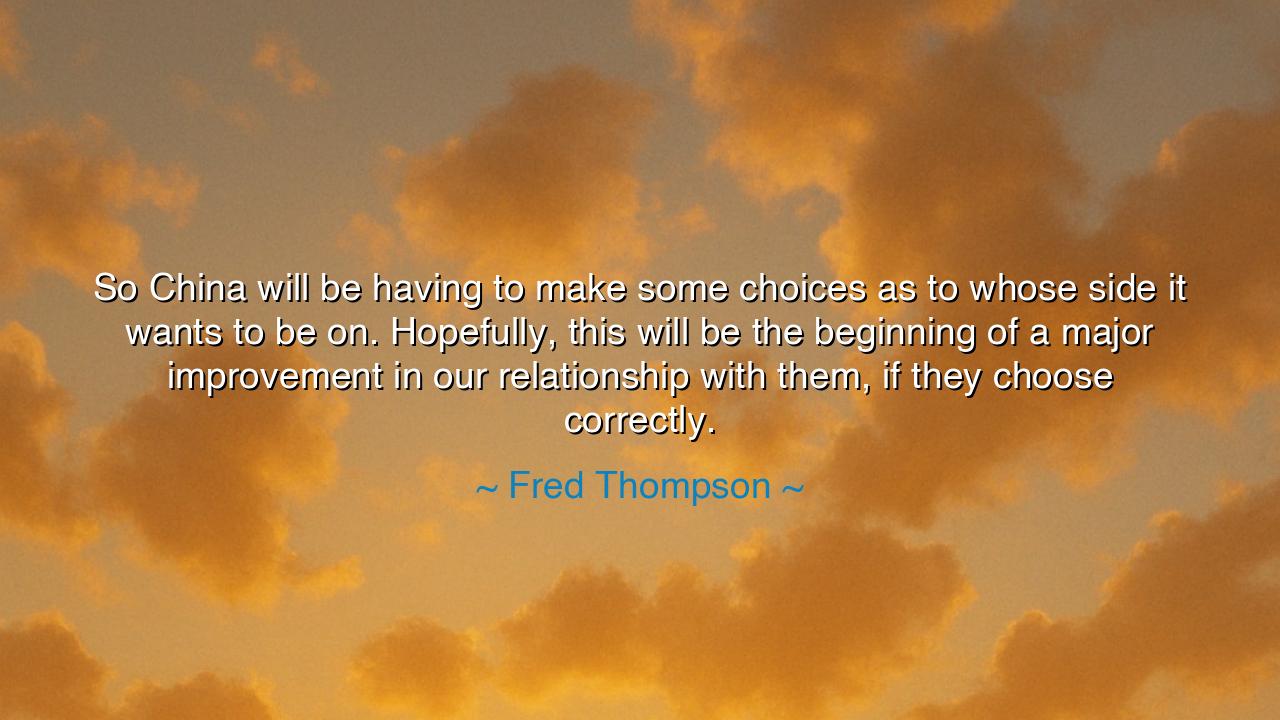
So China will be having to make some choices as to whose side it
So China will be having to make some choices as to whose side it wants to be on. Hopefully, this will be the beginning of a major improvement in our relationship with them, if they choose correctly.






The words of Fred Thompson, “So China will be having to make some choices as to whose side it wants to be on. Hopefully, this will be the beginning of a major improvement in our relationship with them, if they choose correctly,” strike like the voice of an elder cautioning the youth at a crossroads. In them resounds the eternal truth: that nations, like men, are tested not only by their power, but by the choices they make in times of trial.
The heart of this saying lies in the weight of allegiance. To decide one’s side is no light matter, for every path chosen shapes destiny, not only for the present but for generations unborn. When China is called to stand in clarity, it is not merely about alliances of state, but about the spirit of trust, honor, and the shared future of peoples. Thus, the quote is less a threat and more an invitation—a hope that wisdom will triumph over ambition.
The origin of these words comes from a time of tension between nations, when Fred Thompson, a voice in the councils of America, urged reflection upon the course of foreign relations. His counsel bore the tone of both warning and hope: warning, that misguided choices lead to discord; hope, that right action may open the gates to improvement and harmony. In this duality we hear the ancient principle that conflict and peace are both born of the decisions of the heart.
Let it be remembered: the fate of alliances is not sealed by power alone, but by choices made with vision and discernment. Nations that choose rightly walk the path of mutual growth; those that choose poorly bind themselves to strife. Therefore, the words of Thompson remain as a lamp for leaders and people alike—reminding them that in the garden of the world, every relationship is a seed, and its fruit depends upon the soil of wisdom in which it is planted.






THLe Kim Tan Huyen
This quote seems to highlight a significant turning point. If China has to choose sides, does that mean it’s finally ready to settle into a more definitive role in global politics? What might that role look like, and how would it impact relationships with other countries, especially the U.S.? It’s a complex situation—how do we even begin to predict the long-term effects of this kind of choice? I’d be interested to hear different perspectives on the potential outcomes.
PTNguyen Phuong Thanh
I’m curious about the notion of 'choosing sides.' What does it mean for a country like China, with its own global ambitions, to align with one side over another? Would this really lead to a major improvement in relationships, or is there always a risk of complex geopolitical tension lingering beneath the surface? Can any major international relationship really be improved with one simple decision, or is it more about consistent effort over time?
Xx.lam
It’s interesting that Fred Thompson frames this as a 'choice' for China. Does it imply that China has been sitting on the fence, waiting to decide? How much influence do other nations have in shaping China’s decisions? Is the hope that improved relationships could come from this choice realistic, or are there deeper, longstanding issues that will continue to affect China’s stance? I'd love to hear thoughts on how realistic this expectation is.
HTHuyeen Tr
This quote makes me think about the delicate balance of international relations. If China really has to choose sides, what does that mean for its current position in global politics? How do we define which side is the 'correct' one? Is it just about strategic alliances, or does it also involve shared values and interests? I wonder if this choice could alter the global power dynamics. What do others think—what should China prioritize in its decision?